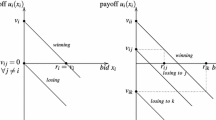Abstract
We study the one-seller/two-buyer bargaining problem with negative identity-dependent externalities with an alternating offer bargaining model in which new owners of the object have the opportunity of resale. We identify the generically unique subgame perfect equilibrium outcome. The resale opportunity increases the competition among the buyers and therefore benefits the seller. When competition between buyers is very fierce, the seller may prefer to respond to bids rather than to propose an offer herself: a first-mover disadvantage.
Similar content being viewed by others
REFERENCES
Binmore, K. (1985), Bargaining and coalitions, in A. Roth (ed.), Game-theoretic models of bargaining, Cambridge University Press, Cambridge (pp. 269–304).
Chowdhury, P. (1998), Externalities and bargaining disagreement, Economics Letters 61: 61–65.
Funk, P. (1996), Auctions with interdependent valuations, International Journal of Game Theory 25: 51–64.
Haller, H. and Holden, S. (1990), A letter to the editor on wage bargaining, Journal of Economic Theory 52: 232–236.
Jehiel, P. and Moldovanu, B. (1995a), Cyclical delay in bargaining with externalities, Review of Economic Studies 62: 619–637.
Jehiel, P. and Moldovanu, B. (1995b), Negative externalities may cause delay in negotiation, Econometrica 63: 1321–1336.
Jehiel, P. and Moldovanu, B. (1995c), Resale markets and the assignment of property rights, CEPR discussion paper 1196.
Jehiel, P. and Moldovanu, B. (1996), Strategic nonparticipation, RAND Journal of Economics 27: 84–93.
Jehiel, P., Moldovanu B. and Stacchetti, E. (1996), How (not) to sell nuclear weapons, American Economic Review 86: 814–829.
Osborne, M. and Rubinstein, A. (1990), Bargaining and Markets, Academic Press, San Diego.
Rubinstein, A. (1982), Perfect equilibrium in a bargaining model, Econometrica 50: 97–109.
Schlicht, E. (1996), Exploiting the Coase mechanism: The extortion problem, Kyklos 49: 319–330.
Shaked, A. and Sutton, J. (1984), Involuntary unemployment as a perfect equilibrium in a bargaining model, Econometrica 52: 1351–1364.
Author information
Authors and Affiliations
Rights and permissions
About this article
Cite this article
Cornet, M. Externalities in a Bargaining Model of Public Price Announcements and Resale. Theory and Decision 49, 375–393 (2000). https://doi.org/10.1023/A:1005213501393
Issue Date:
DOI: https://doi.org/10.1023/A:1005213501393




